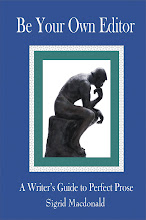Technically, the right way to do this is to say,
"Whom are you voting for?" because the sentence has a direct object.
Or, you can say or write, "For whom are you voting?" This phrasing is
correct; however, I don't like it. I think it sounds stuffy.
Sometimes the only really important thing about
grammar is to know the rules so that you can understand when you are breaking
them. In conversation, I would opt for the more casual, "Who are you
voting for?" And if I were writing a dialogue in a fictional narrative or
quoting someone in a blog post, I would still use the informal version.
But if I were writing for a serious website, of course
I would choose the official version. We are seeing more of a trend toward
casual speech and writing as part of a desire to move forward in the modern
world. Just as we wouldn’t say, "Romeo, Romeo, wherefore art thou,
Romeo?", it sounds stilted and uptight to answer the phone by saying,
"It is I" or "For whom are you voting?" I'm going to
declare this to be a style issue in conversation and when we are quoting
dialogue, but I know that many people will disagree.
Of course you can always circumvent the problem, as I
did in the beginning of this piece, by saying, "Which candidate do you
prefer?" And the answer in this particular election may be
"neither."


